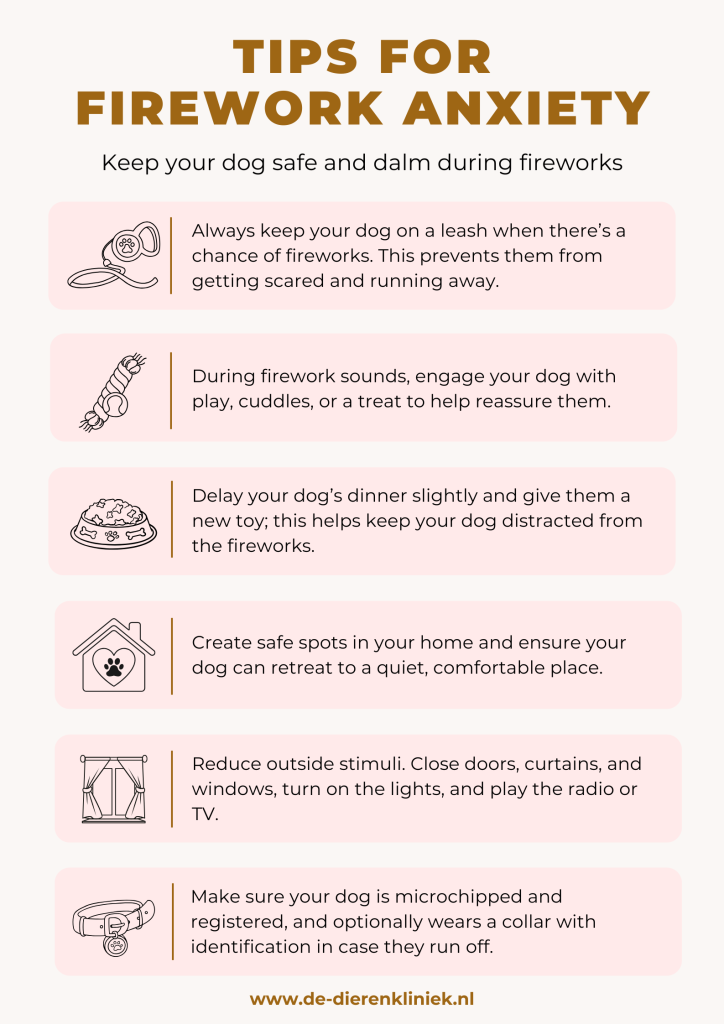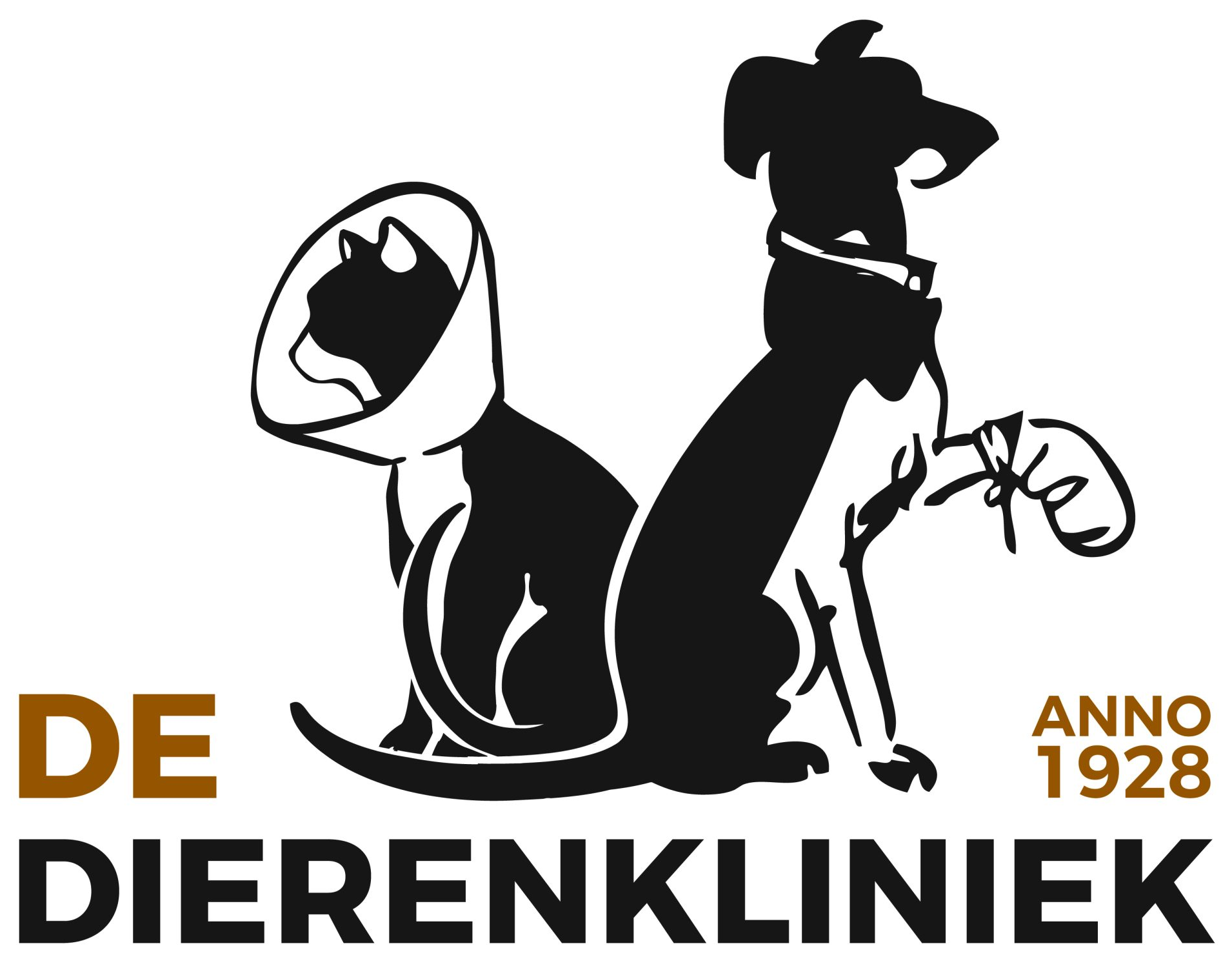Firework anxiety

Sinterklaas, Christmas and New Year’s Eve: for us, this is a time of joy and celebration – with visitors, music, presents, Christmas trees and delicious scents. For many dogs, however, this season is anything but festive. Especially New Year’s Eve can be a stressful and unpleasant time.
Is your dog afraid of fireworks? Read here how you can help your dog get through these days with as little stress as possible.
What is firework anxiety?
Firework anxiety is a form of hypersensitivity to loud noises. Dogs with this fear don’t just react to fireworks, but sometimes also to other loud sounds such as thunderstorms, sirens, or bangs. These noises can cause them to experience intense stress and tension.
Dogs suffering from firework anxiety may show various signs of fear and discomfort. It’s important to take these signs seriously, as the fear can feel very real and overwhelming for your dog.
Why do dogs suffer from firework anxiety?
Firework anxiety in dogs can have several causes. One important cause is that fear of loud noises can be hereditary. Dogs perceive loud sounds as a threatening situation. Additionally, firework anxiety often develops when a dog has had a negative experience with fireworks or other loud noises. Such experiences can have a significant impact, causing the dog to develop a trauma and associate loud sounds with danger, which leads to fearful reactions.
How do I know if my dog is afraid of fireworks?
Dogs often show their fear through subtle body language and behavior. Pay close attention to the signals your dog gives, because some dogs are real “actors” — they’ve learned that certain behaviors get them extra attention or comfort. Still, it is possible to distinguish between a dog that is a little unsure and a dog that is truly scared.
A fearful dog will often adopt a low posture: the tail hangs down or is even tucked between the legs, the ears are flattened, and the corners of the mouth are pulled back. Many dogs will tremble, yawn, or lick their lips frequently. Your dog may also refuse treats, try to hide, or be reluctant to go outside.
Some dogs become tense days before New Year’s Eve as soon as they hear the first bangs. They may become restless, lose their appetite, or even try to escape. If you notice that your dog behaves differently during December, for example, by being constantly alert or no longer relaxed on walks, this is a clear sign that firework anxiety is playing a role.
When to start addressing firework anxiety?
To prevent firework anxiety, we recommend starting training at the youngest possible age, ideally when your dog is still a puppy. This allows your dog to get used to loud noises early on and helps prevent fear from developing later in life.
If your dog already suffers from firework anxiety and you want to ensure he or she remains as relaxed as possible during the holidays, it is important to start in time. You can support your dog with supplements or training programs. Our advice is to begin at least six weeks before the holiday season.
How can you help your dog?
Stay calm yourself
Dogs are highly attuned to their owner’s emotions and signals. Your own behavior can therefore make a big difference in how your dog reacts to fireworks. Stay calm and relaxed; tension, stress, or panic on your part can actually increase your dog’s fear.
Speak softly and calmly to your dog, offer reassurance without over-rewarding fearful behavior, and maintain control over the situation. By staying calm, you show your dog that there is no reason to panic and help them feel safer.
It is also important to remain consistent: stick to routines as much as possible and respond in predictable ways. This provides your dog with stability during a period that is often chaotic and overwhelming due to loud bangs and unexpected noises.
Your demeanor can literally calm your dog and help them cope better with stressful moments. A calm owner is therefore one of the most important tools in managing firework anxiety.
Don’t punish your dog — comfort your dog!
Whatever training method you use, never punish your dog for showing fear. This will only make the situation worse and can actually increase their anxiety.
Comforting your dog, on the other hand, is very important, especially through physical contact. Hugging, gentle petting, or simply being close to your dog can provide a sense of safety and trust. It helps reduce your dog’s stress levels and shows them that they are safe in your presence. Make sure to do this calmly and allow your dog to respond at their own pace; don’t force them to be cuddled if they withdraw.
During a fearful reaction, avoid giving treats or other rewards, as this can unintentionally reinforce the fearful behavior. The goal is to make your dog feel supported, not to reward their fear.
Sound training
The best way to help your dog is to train them to be less afraid of fireworks. It may seem excessive to go through a full training program for firework anxiety, since the problem only occurs temporarily. However, by helping your dog perceive the sounds as normal, you can prevent the fear from developing. Firework anxiety – or anxiety toward loud noises in general – can worsen as dogs get older, so it is best to start as early as possible.
You can help your dog get used to firework sounds using audio recordings of fireworks. These are available on CDs, but you can also find them online, for example on YouTube. It is important to start early, as this method takes time to be effective.
Play the recording at a very low volume so your dog does not react, and engage your dog with play, petting, or treats. Gradually increase the volume, but never so loud that your dog becomes scared. If your dog shows signs of fear during training, this means the training is too difficult. In that case, go back a few steps and rebuild the training using smaller increments. You can give your dog a treat after the training session as a reward. Repeat this training daily leading up to New Year’s Eve.
Supplements
There are several supplements available that can help support your pet with firework anxiety.
Zylkene is a dietary supplement that contains alpha-casozepine. This substance has a calming effect similar to Valium, but it is not sedating. It can be given 1–2 days before a stressful event, such as a move, a long trip, or a stay at a boarding facility. For pets experiencing long-term stress (for example, due to firework anxiety), effects can be expected after approximately 1–2 weeks. For animals that already become stressed at the first firework sounds, it is recommended to start giving Zylkene 1 month to 2 weeks before New Year’s Eve, so that the medication is effective when the first fireworks are set off (sometimes even weeks in advance).
Prevantil is a supplement based on prickly pear cactus. It acts on the fear receptors in the brain, helping to reduce anxiety and making the dog less fearful.
Unfortunately, it is never possible to predict in advance which supplement your dog will respond to best. For more guidance or information, it is best to consult the assistants at our clinics.
Medication: calming agents
Sometimes, medication may be necessary to help dogs with severe firework anxiety. It’s important to know that not all sedatives are suitable for dogs.
Recommended medications
Sileo
Sileo is a modern medication specifically developed to reduce acute stress and anxiety in dogs, such as during fireworks. The active ingredient, dexmedetomidine, works at a very low dosage and helps to calm anxiety without causing drowsiness. Your dog remains alert and responsive, which is a major advantage compared to older muscle-relaxing drugs.
Pexion
Pexion contains the active ingredient imepitoin, which acts on the GABA system in the brain — a neurotransmitter that promotes calmness and relaxation. It has an anxiolytic (anti-anxiety) effect and can be very helpful for firework anxiety, especially in dogs that tend to be tense or inhibited. Ideally, start Pexion two days before the expected fireworks, or a little earlier if needed.
To prescribe Sileo or Pexion, a consultation is legally required so that we can determine the safest and most effective medication and dosage for your dog.
Not recommended
Acepromazine (Vetranquil)
This medication was once commonly used as a sedative but can actually have the opposite effect, it makes dogs more sensitive to loud noises. While the dog may appear calm, the muscle relaxation prevents normal reactions to fear, and the underlying anxiety can even worsen. For this reason, acepromazine is strongly discouraged.
Safety tips when using calming medication
When taking calming medication, your dog may become temporarily unsteady or uncoordinated. Always supervise your dog closely and avoid leaving them alone, especially outdoors. Make sure they cannot injure themselves or fall, for example by slipping or jumping from furniture.
Tips for firework anxiety
Tip 1: Keep your dog on a leash
Always walk your dog on a leash when there’s a chance of fireworks. This prevents them from getting scared and running off. Ideally, plan the last walk before the first fireworks so your dog stays safe.
Tip 2: Repeat firework training
If you’ve done firework training before, practice during moments when fireworks occur. For example, play, cuddle, or give treats just before or during the first bangs. This helps your dog remain calm.
Tip 3: Dinner and distraction
Consider delaying your dog’s evening meal and offer a new toy. Dogs that are engaged or hungry pay less attention to fireworks.
Tip 4: Create safe spaces
Let your dog choose a spot in the house where they feel comfortable and safe. A crate, cozy corner, or soft bed can help reduce stress.
Tip 5: Limit outside stimuli
Close doors, curtains, and windows, keep lights on, and turn on the radio or TV. This makes loud noises and flashing lights from outside less noticeable.
Tip 6: Ensure identification
Make sure your dog is microchipped and registered, and consider a collar with your phone number. If your dog accidentally runs off, you’ll be able to find them quickly.
Would you like more information about firework anxiety? Please feel free to contact us.
We wish you a wonderful holiday season!

Our Behaviour Specialist
For advice on how to best manage your dog’s anxiety, or if you are dealing with persistent behavioural issues, you can contact our behaviour specialist, Caitlyn.
Also interesting


